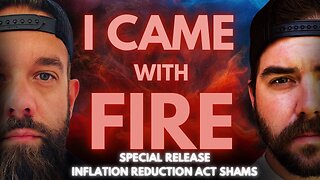Premium Only Content

Mike Winger Critique Episode 6: PSA Fallacies & Tactics, Part 1
One of the most disturbing features of Mike Winger’s series on penal-substitutionary atonement (PSA) is his Orwellian tactic of redefining terms as their antonyms. The most egregious instance of this is his misuse of the word forgiveness. In Winger’s definition, forgiveness actually means exacting the full penalty for an infraction, which is odd and contrary to the common understanding of forgiveness. Paul Vendredi then references the writings of John MacArthur and John Piper, two other theologians in the atonement school, to support the argument that forgiveness should have its lexical meaning: namely, letting go of a debt or offense, not exacting a penalty. Host Warren McGrew uses an analogy of child rearing to illustrate the point, suggesting that if children were taught to follow Winger's definition of forgiveness, they would resort to violence and retaliation instead of forgiveness. Paul uses the illustration of Donald Trump’s presidential pardon of Rod Blogojevich, in which Trump simply erased the remaining years on Blogojevich’s sentence; Trump did not make Blogojevich’s cell mate serve the remainder of the sentence.
Forgiveness is not the only term that Winger mangles. He incorrectly defines rhetoric as specious use of language, while in reality, it is the art of persuasion. Paul also points out that the Book of Romans, which Winger highly regards, is written in a Greco-Roman rhetorical genre called the scholastic diatribe. Since Winger criticizes rhetoric, he should reject the Book of Romans if he follows his own logic.
Winger continually equates PSA with the Gospel itself, a fallacy known as "tautological question"; that is, when a person presupposes his interpretation of an event, thereby precluding others from interpreting it differently. Winger frequently asserts that any criticism of PSA is an attack on the gospel or the meaning of the cross, creating a standard that any criticism of his position is a criticism of Christianity itself. Paul laments that this tactic was employed even by his one-time hero, Walter Martin. Paul quotes Martin's book "The New Age Cult," which equates New Testament Christianity with belief in PSA.
The hosts note the increasing stridency and desperation of those who consider themselves gatekeepers of orthodox Protestantism, as these once revered arbiters of truth find themselves out of step with a growing number of conservative Protestants who now reject PSA.
Warren explains how he felt compelled to research the early church's interpretation of the atonement after realizing that his belief in PSA was based on an Augustinian anthropology and reformed paradigm. He acknowledges the difficulty of challenging long-held beliefs and the confusion or despair felt by those who have been taught that PSA is the only valid model of understanding the work of Christ. He warns that Winger's defense of PSA, while perhaps well-intentioned, is dangerous, as it may drive people away from the faith due to its portrayal of God as requiring the sacrifice of his own son for propitiation. Warren shares his personal journey of grappling with tough questions about Christianity and his fear of scrutinizing his beliefs due to a deep-rooted bias towards PSA. He admits that his motivation was largely driven by fear and lack of faith in God and the Bible. However, he eventually decided to trust God and explore alternate models of atonement.
-
 2:47:25
2:47:25
Right Side Broadcasting Network
8 hours agoLIVE REPLAY: President Donald J. Trump Holds First Press Briefing Since Inauguration - 1/21/25
213K175 -
 LIVE
LIVE
Man in America
7 hours ago🔴 LIVE: Trump UNLEASHED! Dismantling the Deep State and Restoring America
1,810 watching -
 27:22
27:22
I_Came_With_Fire_Podcast
9 hours ago🔥SPECIAL RELEASE🔥 Inflation Reduction Act: American Seniors Get SLAMMED!!
4.56K -
 DVR
DVR
vivafrei
7 hours agoD.C. Gulag Jan. 6 Prisoners Release Watch!
160K77 -
 1:49:14
1:49:14
Redacted News
7 hours agoTrump is Back! Congress Uncovers New Biden Crimes One Day After He Leaves D.C. | Redacted
152K216 -
 2:09:53
2:09:53
Benny Johnson
7 hours ago🚨President Trump LIVE Right Now Making MASSIVE Announcement At White House News Conference
247K320 -
 2:04:10
2:04:10
Revenge of the Cis
7 hours agoEpisode 1433: Retribution
110K15 -
 1:42:50
1:42:50
The Criminal Connection Podcast
11 hours ago $0.07 earnedEddie Hearn talks JOSHUA vs FURY, Working With Frank Warren & The Truth About Turki Alalshikh!
52K2 -
 1:00:25
1:00:25
In The Litter Box w/ Jewels & Catturd
1 day agoGolden Age | In the Litter Box w/ Jewels & Catturd – Ep. 724 – 1/21/2025
142K71 -
 57:42
57:42
The Dan Bongino Show
14 hours agoHE'S BACK! (Ep. 2405) - 01/21/2025
1.39M2.41K